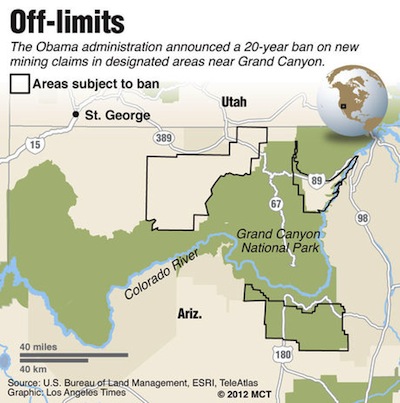On Thursday, Lauren testified before the House Natural Resources Subcommittee on Energy and Mineral Resources. The title: Mining in America: The Administration’s Use of Claim Maintenance Fees and Cleanup of Abandoned Mine Lands. The Members and witnesses discussed a potpourri of topics including: 1872 mining law reform, claim maintenance fees, percentage depletion allowance, abandoned mine lands, Good Samaritan policy, and the recent Grand Canyon mineral withdrawal.
Chairman Lamborn (R-CO) began the hearing, “While many of us support reforming the 1872 law, the question of how and what is subject to great debate and is an area where members aren't nearly as far apart as the special interests would make it appear.”
That is heartening. The Chairman did not elaborate on which areas reaching agreement appears likely. Seems to me that both Republicans and Democrats can get behind placing a royalty on hardrock minerals because the oil and gas industry already pays one. While Earthworks certainly supports that idea, let us not get carried away just because Congress creates a new pot of money. Real reform of the 1872 Mining Law means granting federal land managers authority to determine whether or not a particular mine is actually the best use of public lands.
Abandoned Mine Lands
What we really need a pot of money for is cleaning up abandoned mines. The EPA (Environmental Protection Agency) has estimated this cost around $50 billion. Jamie Connelly with the Bureau of Land Management testified on the Administration’s proposal to create a dedicated funding source to clean up abandoned mines, similar to the one coal miners already pay. This fee would generate $200 million per year and create an estimated 13,000 jobs per year for the mining industry. Earthworks also supports Good Samaritan legislation that removes some Clean Water Act liability in exchange for encouraging bona fide clean up opportunities.
It’s a Double Dip
If Congress is serious about a royalty for hardrock mines, other subsidies also belong on the table. The Percentage Depletion Allowance (PDA) is a tax break extractive industries receive for depleting our natural resources. The mining industry gets it because the value of its assets (the minerals in the ground) declines the more you dig. The oil and gas industries also get this tax break, but at least they pay a royalty for drilling on the public’s lands. With no royalty on hardrock mines, the public’s minerals go to the mining industry for free. Because the mining companies take tax deductions on mineral deposits that they already received for free under the 1872 Mining Law, the PDA functions as a double subsidy.
Reducing Fraud
Well, the public’s minerals are not entirely free. After all, mining companies do have to pay a $140 annual claim maintenance fee for each 20-acre claim. This fee is not part of the 1872 Mining Law, but in 1993 Congress thought it a good idea after a General Accounting Office (GAO) report suggested a fee could reduce fraudulent claims. If a mining claim isn’t worth $140 a year to someone, then it’s probably not a real mining claim. A year later, the fee weeded out 89% of all claims on public lands opening up opportunities for legitimate miners to stake their own valid claims on these newly available lands.
 |
Validity
One public interest protection the 1872 Mining Law does require is claim validity. A claim is valid when a prudent person could reasonably expect to mine the mineral deposit at a profit while complying with all applicable statutes and regulations. The BLM rarely checks claim validity unless they want to withdraw an area of land from mining- as they recently did for nearly 1 million acres near the Grand Canyon. Since BLM rarely checks validity, the mining industry gladly pays the nominal maintenance fee to hold on to dormant claims until the price is right.
You Snooze You Lose
If your claim is valid, you have nothing to worry about. The Grand Canyon withdrawal does not affect valid existing claims- that is, those miners can go ahead and dig. If instead miners decide to stake claims but never bother to establish validity, then they risk losing the right to mine if the government later chooses to protect the area. Some mining companies with invalid claims got swept up in the withdrawal and now are suing.
Real Reform
Any day now we expect Congress will introduce an 1872 Mining Law reform bill. Taking Chairman Lamborn at his word, hopefully we can expect genuine progress re-shaping this antiquated policy in to one that reflects our modern priorities. The days of individual prospectors settling the West with picks and shovels ended long ago. We now have the New West- a region with large populations, increasing environmental problems, and many interests competing for our land and water needs. We need current laws that recognize these changes.
